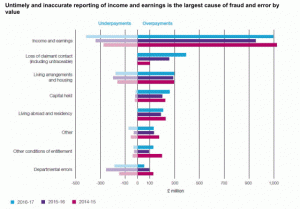It’s being proposed, apparently, that the way to compensate for cutting Universal Credit by £20 a week is to reduce the taper from 63% to 60%. This is, from the point of view of claimants, a very small concession. It would mean that, if they earn £200pw, they would be able to retain all of £6pw in UC, or potentially less than £4 pw lif they’re then subject to tax, National Insurance or loss of Council Tax Reduction.
This very marginal change will cost, according to government sources, will cost £1bn, in place of the £6bn that the current uplift is costing. The second of these figures makes some kind of sense. There are currently about 5.8 million claimants of UC, and at £1040 per year the cost would come to just over £6bn. But the first figure is one I can’t untangle at all, and the scrappy information available on the DWP’s Stat-Xplore site doesn’t help much.
I’ll start with a previously published figure, one which I have to admit I’d simply let pass without even noticing it. It was a claim, when the taper came down from 65% to 63%, that the cost would be £700m. On that basis, each percentage point on the taper costs the government £350m or so. From that, it seems to follow that pulling down the taper by another 3% would cost over £1bn.
When I start to think about it, however, that crude calculation doesn’t look as if it can be right. On current estimates (a forecast for this year) there are 2.3 million people working and receiving UC. Cutting the taper for someone who is already earns £10 pw would allow them to keep an extra 30p in benefit. (If they’re not working, and have no other additional income, they wouldn’t get anything extra.) To cost £1bn, the average income of people who are working and claiming benefit would have to have an income in the region of £300 pw – more or less, a full time minimum wage – and that would bring them all to the point of paying tax and National Insurance, which would claw back more than a quarter of the apparent benefit. Are all the working people who get UC on at least a full time minimum wage? Perhaps others can find the data to support this, but I can’t tell.
The situation is more complicated, because the rules are complicated. The work allowances (which aren’t actually ‘allowances’, but let’s not go there) are only there for families with children, who might well use them, and people with limited capacity, who probably won’t. There’s a difference in the allowances between people who rent and people who don’t. For higher total incomes, there’s a benefit cap. It’s hard, then, even to say how many UC claimants are directly subject to the taper, or what their total income will be. The tally will certainly include single persons in employment, and it will probably include low-income families who are buying a house, but I haven’t been able to extract figures that give me a sensible size for either group. What I think I can say, at least, is that there isn’t a firm, clear constituent group who will certainly benefit from this concession.
It would be possible, and distributively fairer, not to reduce the taper, but to increase the work allowance, ideally making it available (as it used to be) to people without children. That would give a limited but determinate benefit to anyone who works while on UC. A government that was better disposed towards people on low incomes might be more inclined to retain the £20 uplift; but then, a government that was better disposed wouldn’t have introduced this nightmarishly complex system in the first place.
